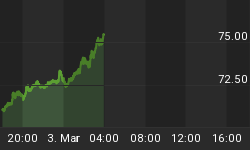Back in April I posted what seemed like an obvious little article noting that soaring commodity prices would probably send interest rates higher. Here's an excerpt:
Now Start Watching Interest Rates
The phase change happened almost imperceptibly. One month we're shedding jobs and agonizing over a long list of insolvent European countries and US states -- and the next month we're back in a bubble. U.S. employment has stopped shrinking and started growing. Iron ore is up 170% in the past year and oil is flirting with $85 a barrel. Hot money is back to chasing emerging market securities and junk bonds. Stocks, as a result of all this, are up pretty much everywhere and the media is full of stories declaring the Great Recession over and "normal" times just around the corner.
Score Round One for the unlimited printing press. Flooding the world with new fiat currency stopped the implosion, and it only took as long as it did because traumatized banks and hedge funds needed some time to recover from their near-death experience. But eventually they did recover, because that's the nature of free money. Sooner or later someone uses it for something and turns a profit and then, terrified of being left out, everyone else joins in and the game begins again.
Now the question is whether this baby bubble (let's call it the government debt bubble) will grow to the stature of its tech stock and housing siblings. In its favor is the fact that only a small fraction of the new reserves created by central banks have so far been put to work; when the rest hit the world's financial bloodstream, picture Uma Thurman after John Travolta stabs her in the chest with the adrenalin needle in Pulp Fiction.
Seriously crappy timing! Within weeks it turned out that spiking commodities were due to Chinese hoarding for the Olympics, and when the event ended so did the price pressures. The next five or so months weren't anything like Uma Thurman in Pulp Fiction; they were actually pretty boring, with falling interest rates and "growth" about as close to zero as it's possible to get.
But then the bubble came back. Precious metals, oil, and stocks are once again soaring and the dollar is plunging, as "currency war" headlines pop up in the mainstream press. So... is this a liquidity-driven boom where rising interest rates become both the trend's validation and the main threat to its continuance? Or is it another head fake, to be followed by a return to deflation?
In the search for an answer, let's start with the fact that Tuesday's blow-off stock market rally was ignited by Japan addressing its too-strong yen by cutting short-term interest rates to zero. This kind of competitive devaluation is central to the inflationist script, as James Turk explained in 2004's Coming Collapse of the Dollar...:
As for how these bad policies and ominous demographic trends translate into worthless currencies, recall that the only reason Japan or Europe can generate even their current meager rates of growth is the willingness of U.S. consumers to buy their Hondas and BMWs. As the dollar plunges, Japanese and European goods, priced in suddenly appreciating currencies, will become prohibitively expensive for U.S. consumers, who will respond by buying U.S.-made alternatives or nothing at all. Correctly interpreting this change in buying patterns as a threat to their vital export sectors, European and Japanese leaders will respond with the only weapon they have left: monetary inflation. They'll cut interest rates and buy dollars with their currencies, flooding the world with euros and yen the way the U.S. now floods the world with dollars. The result of these "competitive devaluations" will be a death spiral for all major fiat currencies, in which European or Japanese bonds will fare as badly as their U.S.
Normally, major governments handing out free money would send the global economy careening towards an inflationary crack-up. But of course this world isn't normal. While the central banks are trying to destroy their currencies, the credit markets are still trying to implode.
The really big news of the past couple of days -- far bigger than Japan cutting short-term rates by half a point -- is the foreclosure fraud debacle, which might paralyze the major banks. Combined with the (million or so?) layoffs and other financial pain flowing from US states and cities, it seems at least possible that in another few months the current mini-bubble will have evaporated like April's, and "double dip" will replace "currency war" in the headlines.
Which puts us pretty much where we've been for the past decade, standing at the corner of Deflation and Hyperinflation, unable to decide which way to turn. Meanwhile, an extraordinary amount of intellectual firepower is building up on both sides of the debate. Not a day goes by without a brilliantly-reasoned article or interview explaining why one outcome is guaranteed and the other a delusion -- followed by an equally-persuasive rebuttal.
The solution? Accept that it's not settled, and that nothing -- not gold, not farmland, not S&P500 put options -- is a lock. Spread the disaster bets around, and -- since some kind of disaster is clearly coming -- at least part of your capital will be there when the dust clears.
















